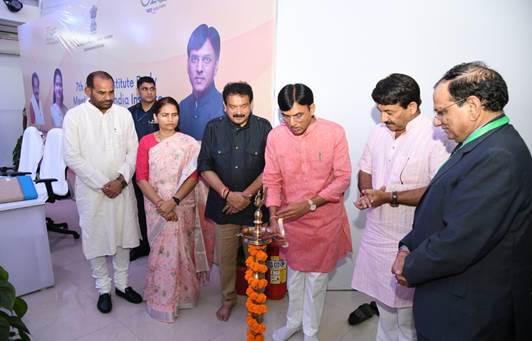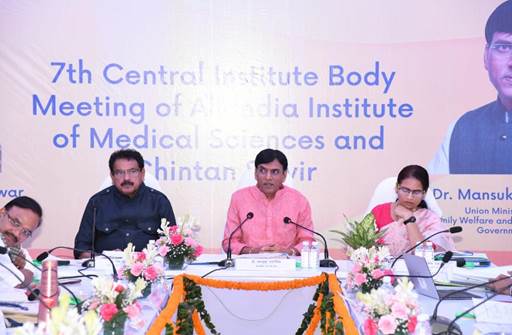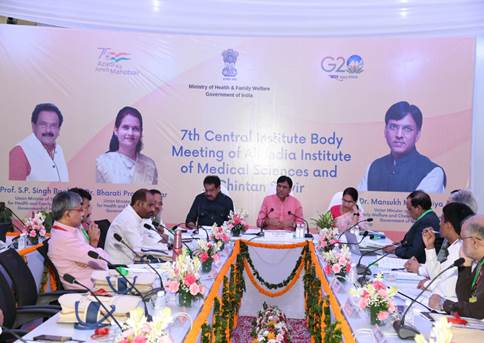By — Shyamal Sinha
“Builders, developers, and collaborators must work in a transparent manner according to the rules and prepare projects as promised to the customers. The focus should be on building trust among the public,” stated Shri. Anand Kumar, Chairman, Real Estate Regulatory Authority (RERA), NCT of Delhi at the National Conference on “Real Estate Development and Action Plan for New India” organised by the Associated Chambers of Commerce and Industry of India (ASSOCHAM).
While addressing the conference Shri Kumar gave a message to all the stakeholders related to the real estate sector to be alert and aware, he said, “while buying any land, plot, flat, commercial property sold as ‘RERA registered,’ check it on RERA’s website.”
Shri Kumar urged the builders, developers, and entrepreneurs working in the real estate sector under the alliance to work with transparency to increase trust in the eyes of their agents, customers, and buyers. Before starting work on any project, it should be registered with RERA.
Urging everyone to work together for the progress of the real estate sector, Shri Anand Kumar said that even today there are a large number of builders and developers who do not want to register with RERA. He also enumerated the reason for this. “The first reason is that if he (developer) joins us, we will continue to investigate him, and secondly if he comes to us, he will have to deliver what he has promised,” he said.
Shri Kumar warned builders and developers who are spreading propaganda to sell flats or shops in projects without RERA registration, saying that strict action will be taken against them. RERA will not give any relaxation in this matter. He said that the atmosphere of mistrust that had developed in the real estate sector during the past years, the way home buyers had to suffer, resulted in the enactment of the RERA Act and a regulator for the sector.
In his long address, he gave information about all the things in which the developer is required to register the project. He said that plots of more than 500 square meters are being developed, projects in which more than eight units, be it shops, flats, apartments, or commercial spaces, are being constructed and plotting of more than 500 square meters of land is being done. Yes, all such projects are required to be registered with RERA. He also made it clear that whether this project or land is in the planned area of Delhi or non-planned area, in both circumstances, they will have to come to the authority.
Shri Kumar also told the developers, “If you have any kind of difficulty, then you can contact u Any day now, we’ll be able to tell you where the problem is with your registration. Get all your documents ready, if the documents are in proper condition, then registration will happen.” He urged all the developers and builders to go through and understand the guidelines completely and follow them.
Shri Kumar said that until all of us do our work with full seriousness and honesty, the dream of Prime Minister Shri Narendra Modi’s house for everyone cannot be fulfilled. The success of the field is not for our benefit alone, but it will benefit everyone. The real estate sector is the second-largest employment-generating sector in the country. The current size of this sector is $260 billion, which is estimated to reach $1,000 billion by 2030. “We have to grow this sector faster than expected. And it is possible only when everyone will do their work with full honesty.
In his special address, Prof Dr. P.S.N Rao, Member, High-level Committee on Urban Planning, MoHUA Govt of India focused on the real estate sector being an integral part of the urban development action plan and how private players have a major role. He said, “The Government of India, along with the governments of respective States, has taken several initiatives to encourage development in the sector like the smart city project.”
According to Shri Sudhir Singh Chauhan, Chief Town Planner, Faridabad Metropolitan Development Authority, Haryana, public-private partnerships in the Haryana state and different housing models are implemented. He stressed the need for contemporary planning in times of natural disasters.
In his welcome speech, Shri Lalit Aggarwal, Vice Chairman & Whole-Time Director Signature Global (India) Ltd and Senior Member, ASSOCHAM, stated that “the real estate business is one of the most well-known industries in the world. The expansion of the business environment and the demand for office space, as well as for housing in urban and semi-urban areas, are excellent complements to the growth of this sector.”
Shri Vineet Relia, Director, Urbanbriq Development Management Services Pvt Ltd, said “The execution of master plans is the key to increase the potential of the infrastructure sector. Government initiatives like Make in India and Startup India encourage real estate entrepreneurs to develop a new landscape in the sector.”
The Managing Director of Resurgent India Limited, Shri Jyoti Prakash Gadia, offered his perspectives on the consumer, investor, and banker perspectives in the real estate market. He named Bengaluru and Pune as the user end markets in India. It is a need for obtaining bank financing, he continued. In India, the ratio of real estate mortgages to GDP is 11%. In this industry, issues with land acquisition, financing, and regulatory risk need to be addressed. He also added that Bankers need to realign there policies for lending to builders post RERA / GST .
Shri Sanjeev Ailawadi, Head-Legal, MAX Estates highlighted that real estate proved to be resilient in difficult times. He informed, “It is also one of the larger employers in the country and the largest provider of taxation.” He further said real estate offers a dignified way of living to the people.

 “There is a wonderful story told of two monks who had renounced the world and taken vows of celibacy and simplicity. One monk was older and the other was relatively young. They were wandering in the forest one day and came upon a rushing river. On the edge of the river stood a beautiful young woman. Her face was marked by anxiety as she explained to the two monks that she needed to get across, but the river was rushing too fast and she was afraid. She humbly asked if one of the monks would be good enough to carry her across. The older monk immediately picked her up gallantly and carried her to the other side while the younger monk walked by his side. Upon reaching the other shore, the monk placed the woman safely on the ground, and they bid her farewell.One week later, the two monks were sitting under a tree for their morning meditations when the younger monk suddenly exclaimed, ‘Okay, I’ve been keeping this inside for the last week but I cannot keep it inside anymore. I cannot believe the way you picked up that young, beautiful woman and carried her body so close to yours! After taking vows of celibacy before God, after promising to forsake the touch of a woman, how could you wrap your arms around her body and carry her tightly in your arms? I have had such respect, even reverence for you for so many years, and now I feel so betrayed. You are not a true monk! You are not a true celibate. I must find another companion with whom I can tread a path of purity.’ The elder monk listened with a faint smile growing across his face. ‘My brother,’ he said when the younger monk had finished his tirade. ‘I carried that young woman in my arms for approximately two minutes and left her by the side of the river, after setting her down safely. She has not been with me since. You, on the other hand, have carried her in your heart for the last week. You have slept with her, eaten with her, breathed with her and even meditated with her because you cannot get her out of your mind. She is living permanently in your heart. It is your own heart you must seek to purify, not the actions of your traveling companions.’How many precious minutes of each day do we waste by judging others? Too many, I think. We barely even realize how much we do it. We analyze and judge each other’s actions, words, and even each other’s articles of clothing or choice of perfume. We assume, naturally, that if we were in their shoes we would do nearly everything better. But, like in the case of the two monks, it is really our own hearts which need to be bettered, not the actions of another.This constant judging and condemning of others pollutes our own hearts, wastes our precious time, creates boundaries and barriers between us, and steals our peace. We are so busy re-hashing everything other people did during the day, of which we did not approve, that we cannot fall asleep at night.Our constant judging of others is not only detrimental to our interpersonal relationships but it also wrecks havoc on our own mental health. The more we become focused on others and their perceived faults, the farther we stray from our own path. We may feel temporarily good when we put others down. Our egos get a natural ‘high’ when we criticize and condemn the other. Yet, we are actually sinking lower and lower on our own quest for true peace.”– H.H. Pujya Swami Chidanand Saraswatiji
“There is a wonderful story told of two monks who had renounced the world and taken vows of celibacy and simplicity. One monk was older and the other was relatively young. They were wandering in the forest one day and came upon a rushing river. On the edge of the river stood a beautiful young woman. Her face was marked by anxiety as she explained to the two monks that she needed to get across, but the river was rushing too fast and she was afraid. She humbly asked if one of the monks would be good enough to carry her across. The older monk immediately picked her up gallantly and carried her to the other side while the younger monk walked by his side. Upon reaching the other shore, the monk placed the woman safely on the ground, and they bid her farewell.One week later, the two monks were sitting under a tree for their morning meditations when the younger monk suddenly exclaimed, ‘Okay, I’ve been keeping this inside for the last week but I cannot keep it inside anymore. I cannot believe the way you picked up that young, beautiful woman and carried her body so close to yours! After taking vows of celibacy before God, after promising to forsake the touch of a woman, how could you wrap your arms around her body and carry her tightly in your arms? I have had such respect, even reverence for you for so many years, and now I feel so betrayed. You are not a true monk! You are not a true celibate. I must find another companion with whom I can tread a path of purity.’ The elder monk listened with a faint smile growing across his face. ‘My brother,’ he said when the younger monk had finished his tirade. ‘I carried that young woman in my arms for approximately two minutes and left her by the side of the river, after setting her down safely. She has not been with me since. You, on the other hand, have carried her in your heart for the last week. You have slept with her, eaten with her, breathed with her and even meditated with her because you cannot get her out of your mind. She is living permanently in your heart. It is your own heart you must seek to purify, not the actions of your traveling companions.’How many precious minutes of each day do we waste by judging others? Too many, I think. We barely even realize how much we do it. We analyze and judge each other’s actions, words, and even each other’s articles of clothing or choice of perfume. We assume, naturally, that if we were in their shoes we would do nearly everything better. But, like in the case of the two monks, it is really our own hearts which need to be bettered, not the actions of another.This constant judging and condemning of others pollutes our own hearts, wastes our precious time, creates boundaries and barriers between us, and steals our peace. We are so busy re-hashing everything other people did during the day, of which we did not approve, that we cannot fall asleep at night.Our constant judging of others is not only detrimental to our interpersonal relationships but it also wrecks havoc on our own mental health. The more we become focused on others and their perceived faults, the farther we stray from our own path. We may feel temporarily good when we put others down. Our egos get a natural ‘high’ when we criticize and condemn the other. Yet, we are actually sinking lower and lower on our own quest for true peace.”– H.H. Pujya Swami Chidanand Saraswatiji




 “Every karma has a return, every seed will grow into a plant or tree, every boomerang will come back to the sender. If you flip the switch, the light will go on. If you plant an apple seed, you will get an apple tree (provided that you water it and care for it properly). As Isaac Newton discovered, this is the law of nature. His discovery gives us one of science and nature’s most fundamental laws: for every action there is an equal and opposite reaction. This reaction will be there independently of our expectations or attachments. Just as the sun will rise every morning whether we expect it to or not, similarly our actions will bear fruits whether we expect the fruits or not.So, the bottom line is not that there will not be fruit of the karma. There definitely will be fruit of our karma. There definitely will be returns of our actions. The bottom line is that we should not become attached to them!What is crucial is that we do not become attached to what that fruit is or what those returns are. Bhagwan Krishna’s instruction to Arjuna on the battlefield was not that his actions wouldn’t bear fruit but that he should not have expectations or attachments regarding what that fruit will be. The motto we should all take from the Gita is, ‘Do your best and leave the rest.’ We must perform our actions to the best of our ability, with full knowledge that they will bear fruit. What fruit they will bear and when that fruit will be borne is out of our hands.”– H.H. Pujya Swami Chidanand Saraswatiji
“Every karma has a return, every seed will grow into a plant or tree, every boomerang will come back to the sender. If you flip the switch, the light will go on. If you plant an apple seed, you will get an apple tree (provided that you water it and care for it properly). As Isaac Newton discovered, this is the law of nature. His discovery gives us one of science and nature’s most fundamental laws: for every action there is an equal and opposite reaction. This reaction will be there independently of our expectations or attachments. Just as the sun will rise every morning whether we expect it to or not, similarly our actions will bear fruits whether we expect the fruits or not.So, the bottom line is not that there will not be fruit of the karma. There definitely will be fruit of our karma. There definitely will be returns of our actions. The bottom line is that we should not become attached to them!What is crucial is that we do not become attached to what that fruit is or what those returns are. Bhagwan Krishna’s instruction to Arjuna on the battlefield was not that his actions wouldn’t bear fruit but that he should not have expectations or attachments regarding what that fruit will be. The motto we should all take from the Gita is, ‘Do your best and leave the rest.’ We must perform our actions to the best of our ability, with full knowledge that they will bear fruit. What fruit they will bear and when that fruit will be borne is out of our hands.”– H.H. Pujya Swami Chidanand Saraswatiji